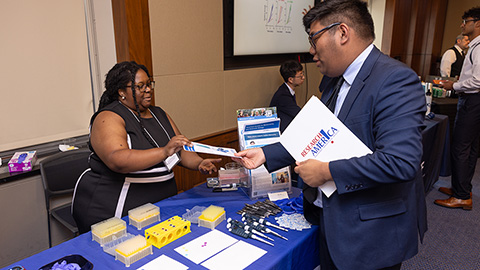In 2019, advocacy will be all down hill
It is the job of the Public Affairs Advisory Committee to advocate for American Society for Biochemistry and Molecular Biology members by communicating your needs to the U.S. Congress, the White House and the federal agencies that support your pursuit of scientific discovery. However, studies show that when individual constituents (that is, voters) talk or write directly to their representatives, those words have greater impact than even the most dedicated advocacy group.
In other words — we need your help.
Your duties as a scientist may limit how much time you have for advocacy. With that in mind, we’ve designed a three-tiered approach to communicating with government officials, and we’re offering a menu of actions to choose from depending on how much time you have.
Here on the East Coast, January brings snow and skiing to mind, so we’re using common ski slope terminology to explain how this works.
With tier one or “green circle” (think bunny slope) activities, you can participate in one minute or less. These simple “click here to send a message” tools will direct emails or tweets to your elected representatives. Green circles are the bread and butter of an advocacy campaign. They are an easy way for ASBMB members to get involved. When you do a green circle activity, it helps us contact as many elected officials from across the country as possible and allows you to be an advocate even if you’re busy.
Tier two activities require a little more effort, like “blue square” ski trails. These activities should take you a half-hour or less. A hand-written letter to a member of Congress or a letter to the editor of your local paper are examples of blue square advocacy opportunities. Your added time and attention will help you (and the ASBMB) develop a stronger connection with your elected officials. And the public affairs staff will provide sample text or topics and all the supporting information you need to author a unique piece of writing for a blue square message.
Finally, in tier three “black diamond” activities, passionate ASBMB members can display their expert advocacy abilities. These opportunities take significant effort but have great impact. Organizing a visit to your representative’s office or a lab tour for government officials are activities that fall in this category. Not all members have the time or opportunity to organize such events, but if you are willing to take up the challenge, the public affairs office will provide you with support and resources.
The Public Affairs Advisory Committee will run several advocacy campaigns in 2019; they will be posted/updated and also include suggested activities at each of the three levels. The first campaign, starting this month, is to educate the freshman class of Congress on the importance of robust federal investments in science. In the spring, we’ll highlight what ASBMB members have been doing with increased funding at the National Institutes of Health in recent years. We also plan to talk about immigration and STEM education policies. If you have a topic you think we should address, send us a message.
We look forward to working with you in 2019.
Enjoy reading ASBMB Today?
Become a member to receive the print edition four times a year and the digital edition monthly.
Learn moreGet the latest from ASBMB Today
Enter your email address, and we’ll send you a weekly email with recent articles, interviews and more.
Latest in Policy
Policy highlights or most popular articles

Embrace your neurodivergence and flourish in college
This guide offers practical advice on setting yourself up for success — learn how to leverage campus resources, work with professors and embrace your strengths.

ASBMB honors Lawrence Tabak with public service award
He will deliver prerecorded remarks at the 2025 ASBMB Annual Meeting in Chicago.

Summer internships in an unpredictable funding environment
With the National Institutes of Health and other institutions canceling summer programs, many students are left scrambling for alternatives. If your program has been canceled or delayed, consider applying for other opportunities or taking a course.

Black excellence in biotech: Shaping the future of an industry
This Black History Month, we highlight the impact of DEI initiatives, trailblazing scientists and industry leaders working to create a more inclusive and scientific community. Discover how you can be part of the movement.

ASBMB releases statement on sustaining U.S. scientific leadership
The society encourages the executive and legislative branches of the U.S. government to continue their support of the nation’s leadership in science.

ASBMB and advocacy: What we accomplished in 2024
PAAC members met with policymakers to advocate for basic scientific research, connected some fellow members with funding opportunities and trained others to advocate for science.

